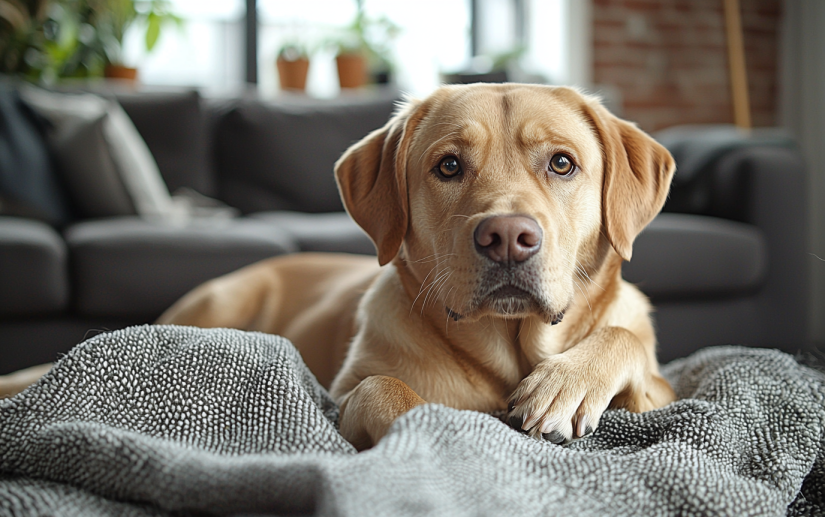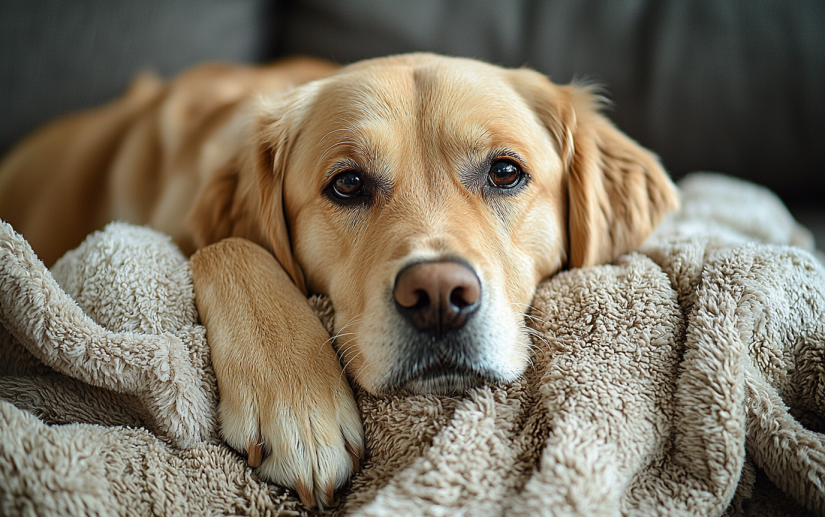What is Kennel Cough?
Kennel cough, also known as canine infectious tracheobronchitis, is a highly contagious respiratory infection that affects a dog’s throat, windpipe (trachea), and lungs. It’s commonly compared to a cold or flu in humans and can be caused by a variety of bacteria and viruses.
This condition got its name because it’s often contracted in places where many dogs congregate, such as kennels, dog parks, daycare centers, and shelters. In these environments, the disease can spread quickly from dog to dog. Fortunately, kennel cough is usually mild and most dogs recover without complications. However, in puppies, elderly dogs, or dogs with compromised immune systems, it can lead to more serious issues like pneumonia.
Common Causes of Kennel Cough
Kennel cough is often the result of a combination of viral and bacterial infections. The most common culprits include:
1. Bordetella bronchiseptica
This is the most frequent bacterial cause of kennel cough. Dogs infected with the Bordetella bacterium often develop symptoms more easily when their immune system is already weakened by a virus. Dogs can carry Bordetella without showing symptoms, meaning they can still spread the illness to other dogs.
2. Canine Parainfluenza Virus
One of the most common viral causes of kennel cough, this virus can lead to inflammation in a dog’s respiratory system, making it more susceptible to bacterial infections like Bordetella.
3. Canine Adenovirus Type 2
This virus affects a dog’s respiratory system, contributing to kennel cough as well as other respiratory diseases like hepatitis.
4. Other Contributing Factors
While infectious agents are the primary cause of kennel cough, several environmental factors can increase a dog’s risk of contracting the illness. Stress, poor ventilation, cold temperatures, and exposure to smoke or dust can weaken the immune system, making a dog more vulnerable to infection.
Symptoms of Kennel Cough in Dogs
Recognizing the signs of kennel cough early on is crucial for effective treatment and reducing the risk of complications. While the symptoms may vary depending on the severity of the infection, the most common symptom is a persistent, forceful cough that often sounds like a honking goose.
Here are the key symptoms to watch for:
1. Persistent Cough
A dry, hacking, or honking cough is the hallmark symptom of kennel cough. This cough is often worse after exercise or excitement and may last for weeks.
2. Retching or Gagging
Some dogs may exhibit retching or gagging, as if they’re trying to clear something from their throat.
3. Sneezing or Runny Nose
Kennel cough can sometimes cause a mild nasal discharge, sneezing, or congestion, particularly if a viral infection is involved.
4. Lethargy
While most dogs with kennel cough remain active and alert, some may become lethargic or more tired than usual.
5. Loss of Appetite or Mild Fever
In more severe cases, dogs may develop a mild fever or show signs of decreased appetite. This can be a sign that the illness is progressing or that your dog’s immune system is under stress.
If your dog exhibits any of these symptoms, particularly the characteristic honking cough, it’s important to take action to avoid further complications.
How Kennel Cough is Spread

Kennel cough is highly contagious and spreads quickly among dogs. It is primarily transmitted through:
1. Airborne Particles
Kennel cough is often spread through the air when an infected dog coughs or sneezes, releasing droplets containing the virus or bacteria. When another dog breathes in these particles, they may become infected.
2. Direct Contact
Dogs can also catch kennel cough by coming into direct contact with an infected dog, such as when playing, greeting, or sniffing.
3. Contaminated Surfaces
Kennel cough pathogens can live on surfaces such as food and water bowls, toys, bedding, or even the hands of humans who have touched an infected dog. When another dog comes into contact with these surfaces, they can contract the illness.
The risk of transmission is especially high in crowded environments like boarding facilities, doggy daycares, and shelters, where dogs are in close quarters.
Treatment Options for Kennel Cough
Most cases of kennel cough are mild and resolve on their own, but it’s still important to manage the symptoms and prevent the spread of the infection. Treatment will depend on the severity of the illness and your dog’s overall health.
1. Rest and Hydration
Allowing your dog to rest is one of the most important steps in recovery. Avoid activities that could strain your dog’s respiratory system, such as strenuous exercise. Make sure your dog has plenty of fresh water to stay hydrated.
2. Medications
In more severe cases or if the infection is bacterial, your veterinarian may prescribe antibiotics to combat the Bordetella bacteria. Additionally, cough suppressants or anti-inflammatories can help reduce the severity of symptoms and make your dog more comfortable.
3. Humidifiers or Steam Therapy
Humidifiers or placing your dog in a bathroom with the hot shower running can help soothe irritated airways, making it easier for your dog to breathe and reducing the frequency of coughing.
4. Veterinary Care for Severe Cases
If your dog’s symptoms worsen or if they are a young puppy, an elderly dog, or have a weakened immune system, it’s important to consult a veterinarian. In rare cases, kennel cough can lead to pneumonia, which may require more intensive treatment such as hospitalization or fluid therapy.
Preventing Kennel Cough in Dogs
Prevention is always better than cure, and there are several steps you can take to reduce the risk of your dog contracting kennel cough.
1. Vaccination
One of the most effective ways to prevent kennel cough is to vaccinate your dog. The Bordetella vaccine is often recommended for dogs that spend time in environments with many other dogs. This vaccine can either be given as an injection or a nasal spray. While it doesn’t guarantee immunity, it significantly reduces the risk and severity of kennel cough.
2. Avoid High-Risk Environments
If possible, avoid taking your dog to places where kennel cough is more likely to spread, especially during outbreaks. Boarding facilities, dog parks, and daycare centers can be hotspots for kennel cough transmission.
3. Good Hygiene
Keeping your dog’s environment clean is another key preventive measure. Regularly disinfect their food and water bowls, bedding, toys, and any surfaces they come into contact with, especially after outings.
4. Reduce Exposure to Stress
Stress can weaken your dog’s immune system, making them more susceptible to illnesses like kennel cough. Ensuring your dog is calm, well-exercised, and mentally stimulated can help keep their immune system strong.
When to See a Vet
Most dogs recover from kennel cough within a couple of weeks, but there are instances where professional care is needed. You should see a veterinarian if:
- Your dog’s cough persists for more than three weeks.
- They become lethargic, lose their appetite, or develop a fever.
- You notice signs of more severe respiratory issues, such as labored breathing or wheezing.
- They’re a puppy, senior dog, or have a compromised immune system.
- The cough worsens or produces blood.
In these cases, a vet can perform diagnostic tests, such as X-rays or a tracheal wash, to rule out more serious conditions and provide appropriate treatment.
Home Care Tips for Dogs with Kennel Cough

While kennel cough is usually not serious, there are a few things you can do to help your dog recover faster and more comfortably at home:
1. Isolate Your Dog
Since kennel cough is highly contagious, it’s important to keep your dog away from other dogs until they’ve fully recovered to prevent spreading the illness.
2. Use a Harness Instead of a Collar
If your dog pulls on their leash, using a harness instead of a collar can reduce irritation to their throat and minimize coughing during walks.
3. Keep Their Environment Calm
Excitement can trigger coughing fits. Keep your home quiet and try to minimize activities that might make your dog excited or anxious during recovery.
4. Boost Immune Health
Support your dog’s immune system by feeding them a healthy, balanced diet, and consider supplements like probiotics or immune boosters (ask your vet for recommendations).
Complications of Untreated Kennel Cough
While kennel cough is often mild and treatable, leaving it untreated can lead to complications, especially in certain dogs. Puppies, senior dogs, or those with preexisting health conditions are at a higher risk of developing more serious issues. Here are a few potential complications:
1. Pneumonia
In some cases, kennel cough can progress to pneumonia, which is a severe lung infection. Symptoms of pneumonia in dogs include difficulty breathing, rapid breathing, a persistent cough, high fever, and lethargy. This condition requires immediate veterinary attention and may involve hospitalization, oxygen therapy, and antibiotics.
2. Chronic Bronchitis
If kennel cough persists for too long or is recurrent, it can lead to chronic bronchitis. This long-term condition causes the airways to become inflamed and scarred, leading to frequent coughing, difficulty breathing, and an overall decline in lung function.
3. Weakened Immune System
For dogs with a compromised immune system (due to age, illness, or medication), kennel cough can weaken their ability to fight off other infections. This increases the risk of secondary infections that may worsen the dog’s health.
4. Severe Respiratory Distress
In rare cases, untreated kennel cough can cause severe respiratory distress, especially in dogs with underlying heart or lung conditions. This can lead to cyanosis (bluish gums), labored breathing, and even collapse, which requires immediate emergency veterinary care.
How Long Does Kennel Cough Last?
The duration of kennel cough can vary based on several factors, including the dog’s age, overall health, and the severity of the infection. Here’s a general timeline:
1. Mild Cases
In mild cases, kennel cough symptoms may last about 1 to 2 weeks. Dogs generally maintain a good appetite and energy level during this time, but the persistent cough can last until the infection runs its course.
2. Moderate to Severe Cases
For moderate to severe cases, especially if complications like bacterial infections occur, the illness can last 3 to 6 weeks. During this period, medical intervention may be necessary, such as antibiotics or cough suppressants.
3. Chronic Cases
If kennel cough leads to complications such as chronic bronchitis or pneumonia, the recovery process can take several months and may require ongoing treatment and management.
Regardless of the duration, it’s important to keep your dog comfortable and follow your veterinarian’s guidance to ensure a smooth recovery.
Kennel Cough in Puppies: Special Considerations

Puppies are particularly vulnerable to kennel cough because their immune systems are still developing. They may have a harder time fighting off the infection and could experience more severe symptoms than adult dogs.
1. Symptoms in Puppies
Puppies with kennel cough may exhibit the typical symptoms—persistent coughing, sneezing, and nasal discharge—but they are also more likely to become lethargic or develop a fever. If a puppy’s immune system is significantly compromised, they may be at greater risk of developing pneumonia.
2. Treatment for Puppies
Because young puppies are more vulnerable, prompt veterinary care is essential if they show signs of kennel cough. Veterinarians may prescribe antibiotics, even if the infection is viral, to prevent secondary bacterial infections. Puppies should be closely monitored for worsening symptoms.
3. Preventing Kennel Cough in Puppies
Vaccination is the best preventive measure for puppies, particularly if they will be attending puppy classes, visiting dog parks, or staying in boarding facilities. Keep puppies away from high-risk environments until they have completed their vaccination schedule.





